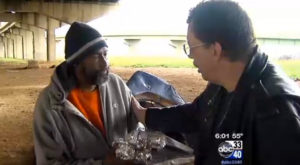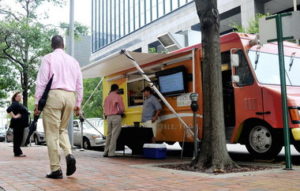
The Lord’s House of Prayer pastor has delivered hundreds of hot dogs and bottles of water to the homeless people in this community, but the city’s new ordinance is attempting to stop that.
According to ThinkProgress, the ordinance places regulations on food trucks and requires operators to get obtain a $500 permit to continue using the vehicles.
The site also pointed out that the ordinance specifically mentioned retailers.
The purpose of the ordinance was to ensure the operators adhere to Department of Health regulations when selling food.
While Wood’s charitable distribution wouldn’t qualify as retail, the city is citing the new ordinance and has given him the option to buy a permit or stop the operation.
Wood feels that this is an example of the city dealing with the issue of homelessness in the wrong way.
“I’m just so totally shocked that the city is turning their back on the homeless like this,” he told ABC 33/40. “It’s like they want to chase them out of the city. And the homeless can’t help the position they’re in. They need help.”
Despite requests to halt his operation, Wood made it clear that he has no plans to stop.
“We will feed people,” he wrote in a blog for HuffPost. “I am, after all (however imperfectly), a follower of Jesus, who said himself that when we ignore hungry people, we ignore him.”
It isn’t the first time someone was asked to stop running an operation to help the homeless people in their community due to food truck regulations.

The permit has a price tag of about $150 to $300 every year, a hefty expense for such a small operation.
Small operations like Wood’s are often the only source of hot food for many homeless people.
One-third of Birmingham’s homeless population had no shelter at all when a survey of the population was conducted in 2013.
The same survey found over 1,400 homeless people in the city of Birmingham alone.
Other major cities, like Los Angeles, are also on the brink of passing legislation that would hinder the service of hot meals to the homeless community via food trucks.


